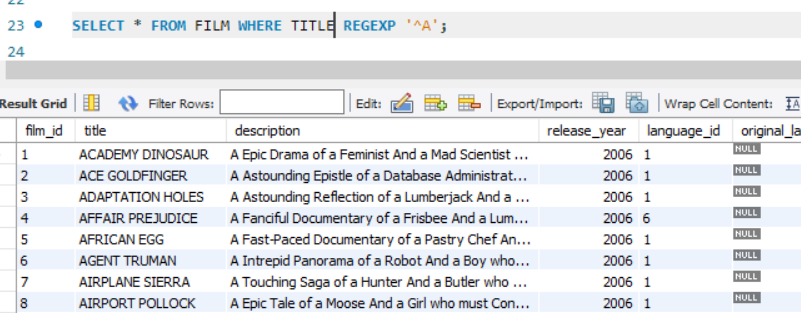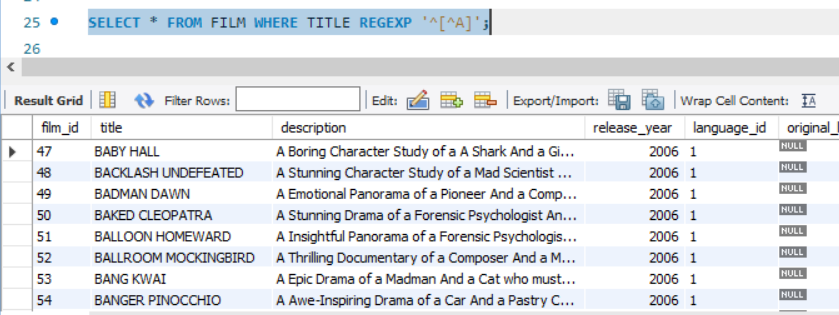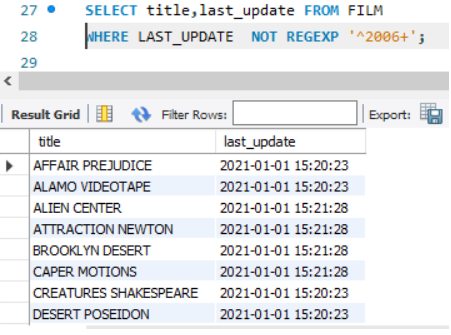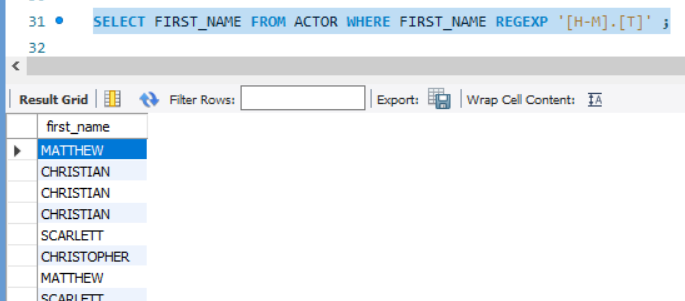MySQL Regular Expressions (Regexp)
Regular expressions or regexes are strings that define a pattern. We can use regexes to check if the data contains a string of digits or strings of alphabets or some pattern.
The main advantage of using regexes is that we can search Strings using more than just Like and % operators.
My SQL supports the regexp, rlike, not regexp operator for supporting regex patterns. The Basic syntax of using a regexp operator is
SELECT <column_list>
FROM <table-names>
WHERE <column of String datatype> REGEXP pattern;
SELECT <column_list>
FROM <table-names>
WHERE <column of String datatype> RLIKE pattern;
SELECT <column_list>
FROM <table-names>
WHERE <column of String datatype> NOT REGEXP pattern;
The regexp needs to be with a column type of String. If the column value matches the pattern, a resultSet is returned. If no matches found then NULL is returned.
To construct regex patterns, we use metacharacters. The metacharacters that can be used are as follows:
| Metacharacter | Behavior |
|---|---|
^ |
matches the position at the beginning of the searched string |
$ |
matches the position at the end of the searched string |
. |
matches any single character |
[…] |
matches any character specified inside the square brackets |
[^…] |
matches any character not specified inside the square brackets |
p1|p2 |
matches any of the patterns p1 or p2 |
* |
matches the preceding character zero or more times |
+ |
matches preceding character one or more times |
{n} |
matches n number of instances of the preceding character |
{m,n} |
matches from m to n number of instances of the preceding character |
The Advantage of Regex patterns is that we can expand the searching of various patterns. The disadvantage of the regex is that they are difficult to maintain.
Some Examples:
Let us look at a few examples of Regex strings we would use in MySQL.
1. If we want to check for all strings that start with the letter 'A', the regex is
SELECT * FROM FILM WHERE TITLE REGEXP '^A';

2. To check all the strings that do not start with A
SELECT * FROM FILM WHERE TITLE REGEXP '^[^A]';

3. To get all such records that have the last updated date other than the year 2006.
SELECT title,last_update FROM FILM WHERE LAST_UPDATE NOT REGEXP '^2006+';

4. To get all such names which have the pattern <some character between H and M> + one character+ T
For example The name: Matthew M (one character between H & M) + A (one single character) + T
SELECT FIRST_NAME FROM ACTOR WHERE FIRST_NAME REGEXP '[H-M].[T]' ;


